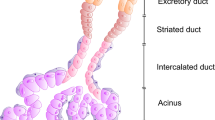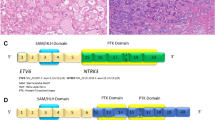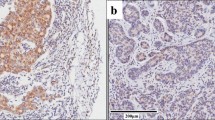Abstract
Extracellular signal-regulated kinase (ERK) has been considered as a critical regulator of diverse cellular processes such as proliferation, survival and motility, being implicated in the malignant transformation in several tissue types. The present study aimed to evaluate the clinical significance of total ERK1 (t-ERK1) and phosphorylated ERK1/2 (p-ERK1/2) protein expression in mobile tongue squamous cell carcinoma (SCC). t-ERK1 and p-ERK1/2 protein expression in tumour cells and infiltrating the tumour microenvironment lymphoid cells was assessed immunohistochemically on 47 mobile tongue SCC tissue samples and was analyzed in relation with clinicopathological characteristics, overall and disease-free patients’ survival. Enhanced nuclear t-ERK1 and p-ERK1/2 expression in tumour cells was associated with the absence of perineural invasion (p = 0.043) and shorter overall patients’ survival (log-rank test, p = 0.028), respectively. Enhanced t-ERK1 expression in infiltrating lymphoid cells was significantly associated with female gender, absence of vascular and perineural invasion, lymph node metastases and early depth of invasion (p = 0.008, p = 0.019, p = 0.011, p = 0.036 and p = 0.001, respectively), as well as with longer disease-free survival times (log-rank test, p = 0.038). Enhanced p-ERK1/2 expression in infiltrating lymphoid cells was significantly associated with the presence of vascular invasion and lymph node metastases (p = 0.019 and p = 0.004, respectively) and shorter overall patients’ survival (log-rank test, p = 0.013). In multivariate analysis, p-ERK1/2 expression in tumour cells and infiltrating lymphoid cells was identified as independent prognostic factors of overall survival (Cox regression analysis, p = 0.045 and p = 0.032, respectively). The present study supported evidence that ERK signalling pathway may exert a potential role in the pathophysiological aspects of the mobile tongue SCC, presenting also potential utility as a biomarker for patients’ survival and reinforcing the development of novel anti-cancer therapies targeting ERK signalling cascade in this type of human malignancy.


Similar content being viewed by others
References
Yoon S, Seger R. The extracellular signal-regulated kinase: multiple substrates regulate diverse cellular functions. Growth Factors. 2006;24:21–44.
Wortzel I, Seger R. The ERK cascade: distinct functions within various subcellular organelles. Genes Cancer. 2011;2:195–209.
Yao Z, Seger R. The ERK signaling cascade–views from different subcellular compartments. Biofactors. 2009;35:407–16.
Lorenz K, Schmitt JP, Schmitteckert EM, Lohse MJ. A new type of ERK1/2 autophosphorylation causes cardiac hypertrophy. Nat Med. 2009;15:75–83.
Chetram MA, Hinton CV. PTEN regulation of ERK1/2 signaling in cancer. J Recept Signal Transduct Res. 2012;32:190–5.
Nicholson B, Schaefer G, Theodorescu D. Angiogenesis in prostate cancer: biology and therapeutic opportunities. Cancer Metastasis Rev. 2001;20:297–319.
Hynes NE, Lane HA. ERBB receptors and cancer: the complexity of targeted inhibitors. Nat Rev Cancer. 2005;5:341–54.
Downward J. Targeting RAS, signalling pathways in cancer therapy. Nat Rev Cancer. 2003;3:11–22.
Wellbrock C, Karasarides M, Marais R. The RAF proteins take center stage. Nat Rev Mol Cell Biol. 2004;5:875–85.
Montagut C, Settleman J. Targeting the RAF-MEK-ERK pathway in cancer therapy. Cancer Lett. 2009;283:125–34.
Kohno M, Tanimura S, Ozaki K. Targeting the extracellular signal-regulated kinase pathway in cancer therapy. Biol Pharm Bull. 2011;34:1781–4.
Bello IO, Soini Y, Salo T. Prognostic evaluation of oral tongue cancer: means, markers and perspectives (I). Oral Oncol. 2010;46:630–5.
Sano D, Myers JN. Metastasis of squamous cell carcinoma of the oral tongue. Cancer Metastasis Rev. 2007;26:645–62.
Shiboski CH, Schmidt BL, Jordan RC. Tongue and tonsil carcinoma: increasing trends in the U.S. population ages 20–44 years. Cancer. 2005;103:1843–9.
Brandwein-Gensler M, Teixeira MS, Lewis CM, et al. Oral squamous cell carcinoma: histologic risk assessment, but not margin status, is strongly predictive of local disease-free and overall survival. Am J Surg Pathol. 2005;29:167–78.
Shintani S, Matsuura H, Hasegawa Y, Nakayama B, Fujimoto Y. The relationship of shape of tumor invasion to depth of invasion and cervical lymph node metastasis in squamous cell carcinoma of the tongue. Oncology. 1997;54:463–7.
Barnes L, Eveson JW, Reichert P, Sidransky D. World Health Organization classifications tumours. Pathology and genetics of head and neck tumours: Lyon, IARC Press; 2005.
Klijanienko J, el-Naggar AK, de Braud, et al. Tumor vascularization, mitotic index, histopathologic grade, and DNA ploidy in the assessment of 114 head and neck squamous cell carcinomas. Cancer. 1995;75:1649–56.
Po Wing Yen A, Lam KY, Lam LK, et al. Prognostic factors clinically stage I and II oral tongue carcinoma: a comparative study of stage, thickness, shape, growth pattern, invasive front malignancy grading, Martinez-Gimeno score and pathologic features. Head Neck. 2002;24:513–20.
Theocharis S, Klijanienko J, Giaginis C, et al. Metallothionein expression in mobile tongue squamous cell carcinoma: associations with clinicopathological parameters and patients survival. Histopathology. 2011;59:514–25.
Theocharis S, Klijanienko J, Giaginis C, Alexandrou P, Patsouris E, Sastre-Garau X. Ephrin Receptor (Eph) -A1, −A2, −A4 and -A7 Expression in mobile tongue squamous cell carcinoma: associations with clinicopathological parameters and patients survival. Pathol Oncol Res. In press.
Søland TM, Husvik C, Koppang HS, et al. A study of phosphorylated ERK1/2 and COX-2 in early stage (T1-T2) oral squamous cell carcinomas. J Oral Pathol Med. 2008;37:535–42.
Yang Z, Guan B, Men T, Fujimoto J, Xu X. Comparable molecular alterations in 4-nitroquinoline 1-oxide-induced oral and esophageal cancer in mice and in human esophageal cancer, associated with poor prognosis of patients. In Vivo. 2013;27:473–84.
Svensson S, Jirstrom K, Ryden L, et al. ERK phosphorylation is linked to VEGFR2 expression and Ets-2 phosphorylation in breast cancer and is associated with tamoxifen treatment resistance and small tumours with good prognosis. Oncogene. 2005;24:4370–9.
Massidda B, Sini M, Budroni M, et al. Molecular alterations in key-regulator genes among patients with T4 breast carcinoma. BMC Cancer. 2010;10:458.
Ma L, Lan F, Zheng Z, et al. Epidermal growth factor (EGF) and interleukin (IL)-1beta synergistically promote ERK1/2-mediated invasive breast ductal cancer cell migration and invasion. Mol Cancer. 2012;11:79.
Vicent S, Lopez-Picazo JM, Toledo G, et al. ERK1/2 is activated in non-small-cell lung cancer and associated with advanced tumors. Br J Cancer. 2004;90:1047–52.
Galleges Ruiz MI, Floor K, Steinberg SM, et al. Combined assessment of EGFR pathway-related molecular markers and prognosis of NSCLC patients. Br J Cancer. 2009;100:145–52.
Shi Y, Chen L, Li J, et al. Prognostic and predictive values of pERK1/2 and pAkt-1 expression in non-small cell lung cancer patients treated with adjuvant chemotherapy. Tumour Biol. 2011;32:381–90.
Atmaca A, Pauligk C, Steinmetz K, Altmannsberger HM, Jäger E, Al-Batran SE. Prognostic impact of phosphorylated mitogen-activated protein kinase expression in patients with metastatic gastric cancer. Oncology. 2011;80:130–4.
Luo ZY, Wang YY, Zhao ZS, Li B, Chen JF. The expression of TMPRSS4 and Erk1 correlates with metastasis and poor prognosis in Chinese patients with gastric cancer. PLoS One. 2013;8:e70311.
Schmitz KJ, Wohlschlaeger J, Lang H, et al. Activation of the ERK and AKT signalling pathway predicts poor prognosis in hepatocellular carcinoma and ERK activation in cancer tissue is associated with hepatitis C virus infection. J Hepatol. 2008;48:83–90.
Handra-Luca A, Lesty C, Hammel P, et al. Biological and prognostic relevance of mitogen-activated protein kinases in pancreatic adenocarcinoma. Pancreas. 2012;41:416–21.
Campbell L, Nuttall R, Griffiths D, Gumbleton M. Activated extracellular signal-regulated kinase is an independent prognostic factor in clinically confined renal cell carcinoma. Cancer. 2009;115:3457–67.
Mizumoto Y, Kyo S, Mori N, et al. Activation of ERK1/2 occurs independently of KRAS or BRAF status in endometrial cancer and is associated with favorable prognosis. Cancer Sci. 2007;98:652–8.
Karlou M, Saetta AA, Korkolopoulou P, et al. Activation of extracellular regulated kinases (ERK1/2) predicts poor prognosis in urothelial bladder carcinoma and is not associated with B-Raf gene mutations. Pathology. 2009;41:327–34.
Schmitz KJ, Wohlschlaeger J, Alakus H, et al. Activation of extracellular regulated kinases (ERK1/2) but not AKT predicts poor prognosis in colorectal carcinoma and is associated with k-ras mutations. Virchows Arch. 2007;450:151–9.
Levidou G, Saetta AA, Gigelou F, et al. ERK/pERK expression and B-raf mutations in colon adenocarcinomas: correlation with clinicopathological characteristics. World J Surg Oncol. 2012;10:47.
Jorgensen K, Holm R, Maelandsmo GM, Florenes VA. Expression of activated extracellular signal-regulated kinases 1/2 in malignant melanomas: relationship with clinical outcome. Clin Cancer Res. 2003;9:5325–31.
Zhuang L, Lee CS, Scolyer RA, et al. Activation of the extracellular signal regulated kinase (ERK) pathway in human melanoma. J Clin Pathol. 2005;58:1163–9.
Na KY, Kim YW, Park YK. Mitogen-activated protein kinase pathway in osteosarcoma. Pathology. 2012;44:540–6.
Gregorj C, Ricciardi MR, Petrucci MT, et al. ERK1/2 phosphorylation is an independent predictor of complete remission in newly diagnosed adult acute lymphoblastic leukemia. Blood. 2007;109:5473–6.
D'Angelo V, Crisci S, Casale F, et al. High Erk-1 activation and Gadd45a expression as prognostic markers in high risk pediatric haemolymphoproliferative diseases. J Exp Clin Cancer Res. 2009;28:39.
Wang L, Liu T, Nishioka M, Aguirre RL, Win SS, Okada N. Activation of ERK1/2 and cyclin D1 expression in oral tongue squamous cell carcinomas: relationship between clinicopathological appearances and cell proliferation. Oral Oncol. 2006;42:625–31.
Ebisuya M, Kondoh K, Nishida E. The duration, magnitude and compartmentalization of ERK MAP kinase activity: mechanisms for providing signaling specificity. J Cell Sci. 2005;118:2997–3002.
Kavitha K, Kowshik J, Kishore TK, Baba AB, Nagini S. Astaxanthin inhibits NF-κB and Wnt/β-catenin signaling pathways via inactivation of Erk/MAPK and PI3K/Akt to induce intrinsic apoptosis in a hamster model of oral cancer. Biochim Biophys Acta. 1830;2013:4433–44.
Li B, Lu L, Zhong M, et al. Terbinafine inhibits KSR1 and suppresses Raf-MEK-ERK signaling in oral squamous cell carcinoma cells. Neoplasma. 2013;60:406–12.
Shin HK, Kim J, Lee EJ, Kim SH. Inhibitory effect of curcumin on motility of human oral squamous carcinoma YD-10B cells via suppression of ERK and NF-kappaB activations. Phytother Res. 2010;24:577–82.
Park IS, Jo JR, Hong H, et al. Aspirin induces apoptosis in YD-8 human oral squamous carcinoma cells through activation of caspases, down-regulation of Mcl-1, and inactivation of ERK-1/2 and AKT. Toxicol In Vitro. 2010;24:713–20.
Knecht R, Peters S, Solbach C, Baghi M, Gstöttner W, Hambek M. EGFR antibody-supplemented TPE-chemotherapy. Preclinical investigations to a novel approach for head and neck cancer induction treatment. Anticancer Res. 2003;23:4789–95.
Lorch JH, Thomas TO, Schmoll HJ. Bortezomib inhibits cell-cell adhesion and cell migration and enhances epidermal growth factor receptor inhibitor-induced cell death in squamous cell cancer. Cancer Res. 2007;67:727–34.
Masuelli L, Marzocchella L, Quaranta A, Palumbo C, Pompa G, Izzi V, et al. Apigenin induces apoptosis and impairs head and neck carcinomas EGFR/ErbB2 signaling. Front Biosci (Landmark Ed). 2011;16:1060–8.
Wali RK, Kunte DP, De La Cruz M, Tiwari AK, Brasky J, Weber CR, et al. Topical polyethylene glycol as a novel chemopreventive agent for oral cancer via targeting of epidermal growth factor response. PLoS One. 2012;7:e38047.
Roberts PJ, Der CJ. Targeting the Raf-MEK-ERK mitogen-activated protein kinase cascade for the treatment of cancer. Oncogene. 2007;26:3291–310.
Friday BB, Adjei AA. Advances in targeting the Ras/Raf/MEK/Erk mitogen activated protein kinase cascade with M EK inhibitors for cancer therapy. Clin Cancer Res. 2008;14:342–6.
Pratilas CA, Solit DB. Targeting the mitogen-activated protein kinase pathway: physiological feedback and drug response. Clin Cancer Res. 2010;16:3329–34.
Conflicts of interest
All authors verify that they have not accepted any funding or support from an organization that may in any way gain or lose financially from the results of the present study. All authors verify that they have not been employed by an organization that may in any way gain or lose financially from the results of the present study. None of the authors have any other conflicting interest.
Author information
Authors and Affiliations
Corresponding author
Additional information
Stamatios Theocharis and Ioly Kotta-Loizou contributed equally to this work.
Rights and permissions
About this article
Cite this article
Theocharis, S., Kotta-Loizou, I., Klijanienko, J. et al. Extracellular signal-regulated kinase (ERK) expression and activation in mobile tongue squamous cell carcinoma: associations with clinicopathological parameters and patients survival. Tumor Biol. 35, 6455–6465 (2014). https://doi.org/10.1007/s13277-014-1853-9
Received:
Accepted:
Published:
Issue Date:
DOI: https://doi.org/10.1007/s13277-014-1853-9




